Tuesday, July 30, 2024. Annette’s News Roundup.

Democracy turns on a Dime.
Letters from an American. Heather Cox Richardson. July 28, 2024.

Just a week ago, it seems, a new America began. I’ve struggled ever since to figure out what the apparent sudden revolution in our politics means.
I keep coming back to the Ernest Hemingway quote about how bankruptcy happens. He said it happens in two stages, first gradually and then suddenly.
That’s how scholars say fascism happens, too—first slowly and then all at once—and that’s what has been keeping us up at night.
But the more I think about it, the more I think maybe democracy happens the same way, too: slowly, and then all at once.
At this country’s most important revolutionary moments, it has seemed as if the country turned on a dime.
In 1763, just after the end of the French and Indian War, American colonists loved that they were part of the British empire. And yet, by 1776, just a little more than a decade later, they had declared independence from that empire and set down the principles that everyone has a right to be treated equally before the law and to have a say in their government.
The change was just as quick in the 1850s. In 1853 it sure looked as if the elite southern enslavers had taken over the country. They controlled the Senate, the White House, and the Supreme Court. They explicitly rejected the Declaration of Independence and declared that they had the right to rule over the country’s majority. They planned to take over the United States and then to take over the world, creating a global economy based on human enslavement.
And yet, just seven years later, voters put Abraham Lincoln in the White House with a promise to stand against the Slave Power and to protect a government “of the people, by the people, and for the people.” He ushered in “a new birth of freedom” in what historians call the second American revolution.
The same pattern was true in the 1920s, when it seemed as if business interests and government were so deeply entwined that it was only a question of time until the United States went down the same dark path to fascism that so many other nations did in that era. In 1927, after the execution of immigrant anarchists Nicola Sacco and Bartolomeo Vanzetti, poet John Dos Passos wrote: “they have clubbed us off the streets they are stronger they are rich they hire and fire the politicians the newspaper editors the old judges the small men with reputations….”
And yet, just five years later, voters elected Franklin Delano Roosevelt, who promised Americans a New Deal and ushered in a country that regulated business, provided a basic social safety net, promoted infrastructure, and protected civil rights.
Every time we expand democracy, it seems we get complacent, thinking it’s a done deal. We forget that democracy is a process and that it’s never finished.
And when we get complacent, people who want power use our system to take over the government. They get control of the Senate, the White House, and the Supreme Court, and they begin to undermine the principle that we should be treated equally before the law and to chip away at the idea that we have a right to a say in our government. And it starts to seem like we have lost our democracy.
But all the while, there are people who keep the faith. Lawmakers, of course, but also teachers and journalists and the musicians who push back against the fear by reminding us of love and family and community. And in those communities, people begin to organize—the marginalized people who are the first to feel the bite of reaction, and grassroots groups.
They keep the embers of democracy alive.
And then something fans them into flame.
In the 1760s it was the Stamp Act, which said that men in Great Britain had the right to rule over men in the American colonies. In the 1850s it was the Kansas-Nebraska Act, which gave the elite enslavers the power to rule the United States. And in 1929 it was the Great Crash, which proved that the businessmen had no idea what they were doing and had no plan for getting the country out of the Great Depression.
The last several decades have felt like we were fighting a holding action, trying to protect democracy first from an oligarchy and then from a dictator. Many Americans saw their rights being stripped away…even as they were quietly becoming stronger.
That strength showed in the Women’s March of January 2017, and it continued to grow—quietly under Donald Trump and more openly under the protections of the Biden administration. People began to organize in school boards and state legislatures and Congress. They also began to organize over TikTok and Instagram and Facebook and newsletters and Zoom calls.
And then something set them ablaze. The 2022 Dobbs v. Jackson Women’s Health Organization decision stripped away from the American people a constitutional right they had enjoyed for almost fifty years, and made it clear that a small minority intended to destroy democracy and replace it with a dictatorship based in Christian nationalism.
When President Joe Biden announced just a week ago that he would not accept the Democratic nomination for president, he did not pass the torch to Vice President Kamala Harris.
He passed it to us.
It is up to us to decide whether we want a country based on fear or on facts, on reaction or on reality, on hatred or on hope.
It is up to us whether it will be fascism or democracy that, in the end, moves swiftly, and up to us whether we will choose to follow in the footsteps of those Americans who came before us in our noblest moments, and launch a brand new era in American history.
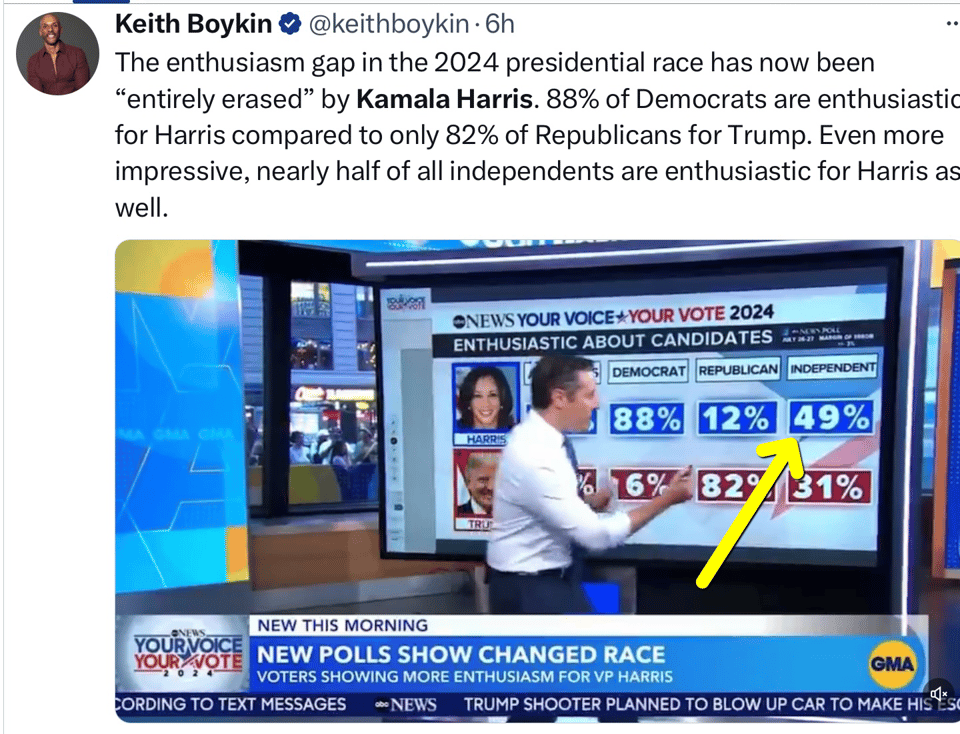
What Kamala and we are up against.
The 2 articles below 👇 make clear what has happened.
A wise look at what happened to the Republican Party.
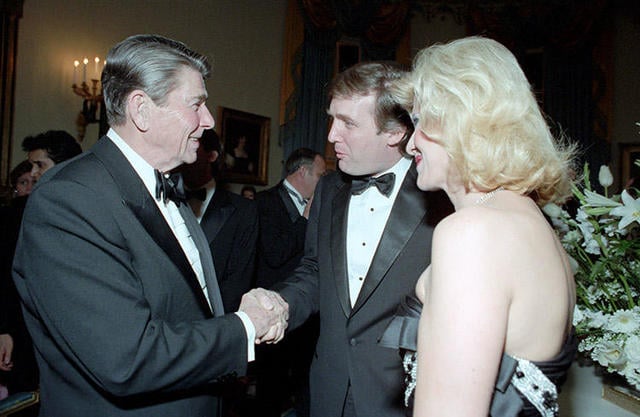
What Has Happened to My Party Haunts Me.
By Peter Wehner
Mr. Wehner, a senior fellow at the Trinity Forum, is a contributing Opinion writer.
With so much attention focused on the changes at the top of the Democratic ticket, we are not paying enough attention to the lack of change on the top of the Republican ticket. This month, Donald Trump won his party’s nomination for the third straight time. Whatever else we might say about him, he is a transformative figure.
This further confirmed, for me at least, the wisdom of my decision eight years ago to break with the Republican Party. In January 2016, I warned what were then my fellow Republicans that if they nominated Mr. Trump, he would constitute a grave threat to the nation. But I added that there was an additional reason to oppose him: Mr. Trump’s nomination would pose a profound danger to the Republican Party, in ways that Hillary Clinton never could. “For while Mrs. Clinton could inflict a defeat on the Republican Party, she could not redefine it,” I wrote. “But Mr. Trump, if he were the Republican nominee, would.”
And so he has. Few figures in American history have overhauled a political party as quickly and as fundamentally as Mr. Trump has. To understand just how different it is, we need to go back briefly to what it was like in the pre-Trump era.
During the time I served in three Republican administrations (Reagan and both Bushes), the party was hawkish and unrelentingly critical of the Soviet Union and then Russia. It was supportive of NATO. It condemned anti-American dictators and authoritarian leaders. It was deeply committed to “the common task of strengthening democracy throughout the world,” as Reagan said in 1982. And it argued that it was in America’s interest to provide global leadership.
The Republican Party championed free trade and fiscal discipline, though in practice it often fell short. It was welcoming of legal immigrants and refugees. Republicans argued that reforming entitlement programs was vital. Many of its leading figures insisted that moral character was an essential trait for political leaders and especially for presidents. Republicans warned, too, that a cruel, squalid political culture undermined a decent society.
Today, the Republican Party has jettisoned every one of these commitments.
Even on abortion, things have changed. The Republican Party has been pro-life for decades, including in its party plank. But this month that plank was removed. Princeton’s Robert P. George, a significant figure in the pro-life movement, pointed out that that plank has been replaced by the claim that abortion policy is entirely the business of states, which may, if they wish, permit abortion up to birth. Mr. Trump succeeded in overturning Roe v. Wade, but now that the abortion issue is a political liability, he has thrown the “pro-life cause under the bus,” Mr. George wrote on Facebook. Mr. Trump has succeeded where liberal Republicans long failed.
So how should we understand what it means to be a Republican now?
Jonathan Rauch, a scholar at the Brookings Institution and my sometime co-author, told me that to begin to understand what has happened, you have to understand the difference between a personal political machine and a traditional political machine. Unlike normally functioning parties and their political machines, like Tammany Hall, Mr. Rauch said, a personal political machine is dedicated to the interests of an individual and that individual’s family, loyalists and operatives. It accepts only one person as leader and requires submission to that person. Today, Mr. Trump is that person.
Personal machines are different from party machines, Mr. Rauch added, because they’re inconsistent with democratic politics. Even a corrupt party machine maintains institutional interests separate from those of its leader. It rewards and punishes behavior based on the electoral interests of the party, prioritizing winning elections over personal loyalty to the boss. A party machine thus rewards followers by getting them elected and then sustaining them in office. By contrast, a personal machine is willing to lose elections rather than share power with other leaders or factions. It puts the leader ahead of the party, and it would rather the party lose elections than the leader lose control.
“Because a personal machine puts loyalty ahead of electability, it must resort to authoritarian and anti-democratic measures like coercion and intimidation to preserve its hold on the party,” Mr. Rauch said. “It may physically threaten those who do not play ball. And it will use propaganda and the party organization to build up the leader as the one and only true expression of the party. That’s why Trump’s Republican Party is a cult of personality.”
Yuval Levin of the American Enterprise Institute told me that as a practical matter, the Republican Party at this point should be understood as the anti-left party. “It understands itself defensively, as speaking for a coalition that is being abused, excluded, mistreated and pushed around by a left-leaning elite in American life,” he said. “Its sense of purpose is therefore fundamentally defensive. That means it is largely defined in opposition to its understanding of the left, more than it is defined by a specific policy vision of its own.”
“That opposition,” he added, “obviously gives shape to some assertive or constructive action, too, but the vision of America underlying that action is largely a function of Republicans think Democrats are trying to destroy.” JD Vance, Mr. Trump’s pick for vice president, told The American Conservative magazine in 2021, “I think our people hate the right people.” (Mr. Trump’s choice of Senator Vance, whatever its electoral wisdom, validates the critiques made by both Mr. Rauch and Mr. Levin.)
This reactionary version of the party is drawn to Mr. Trump because he defines himself by his enemies, and those enemies are in many cases the left-leaning elite. The left is contemptuous of Mr. Trump, and since the Republican Party has implicitly become a party that stands for what the left despises, it has been very difficult to separate Republican voters from Mr. Trump in the name of any more positive vision or ideal. Mr. Levin put it this way: “The left isn’t going to hate anyone more than they hate Mr. Trump, so Republicans aren’t going to love anyone more than they love Mr. Trump.”
A third way to understand today’s Republican Party, something that grows more obvious with every passing day, is that it has become a populist rather than a conservative party. This doesn’t mean that it isn’t conservative here and there, now and then. What it does mean is that when traditionally conservative views aren’t in alignment with populist views, it’s the traditionally conservative views that most often get jettisoned. The Republican Party’s move toward populism isn’t entirely new; even before Mr. Trump the Republican Party was trying to become more of a workers’ party and reorient the party toward the way people actually live their lives day to day. Nor did the embrace of populism need to be entirely bad.
Populism has its place. It can be an understandable response to enormous and rapid economic and social changes. It can alert elites to problems they may be out of touch with, including vast inequality, an indifference to beleaguered lives and shattered communities, and widespread institutional failure. As the political theorist Francis Fukuyama has written, “Populism is a very crude expression of public will that does not like institutional constraints.”
Mr. Trump tapped into the growing resentment of millions of voters. He was seen by them as their tribune. Unfortunately, he exploited their fears and did almost nothing to solve their problems. But that doesn’t seem to matter to them. It’s all about the posturing.
The Republican Party, rather than embracing the best aspects of populism, has taken on its vices: anti-intellectualism, anti-institutionalism and anti-elitism; feeding off negative emotions like anger, grievances and vengeance; and a propensity to believe and to spread conspiracy theories. Populism often looks for scapegoats, frequently blaming immigrants and those who are ethnically and culturally different. Populists are also historically attracted to demagogues and authoritarian personalities.
But the most worrisome feature that has defined the Republican Party during the Trump era is a relentless assault on reality, fused with lawlessness and the embrace of illiberalism.
The Republican Party once preached about the importance of standing for moral truths and standing against moral relativism; today it is, in important respects, nihilistic. The Republican Party once described itself as the party of “law and order”; it now worships a man who is a felon, who was found liable for sexual assault and defamation, and who portrays the violent mob that attacked the Capitol as a band of patriotic “J6 martyrs.” Republicans once proudly proclaimed their reverence for the Constitution; in Milwaukee, they crowned as their leader a man who attempted to subvert it.
It’s hard and haunting to know that the political party to which I devoted a significant part of my life has become the greatest political threat to the country I love. (Op-ed, New York Times).
The Supreme Court Gives the President the Power of a King | Brennan Center for Justice

It long had seemed that the “stall” would be the worst thing the Supreme Court could do when it came to Donald Trump’s claim of immunity from prosecution. How naive.
Delay there will be. The six justices in the Republican-appointed supermajority held, “A former president is entitled to absolute immunity from criminal prosecution for actions within his ‘conclusive and preclusive constitutional authority.’” They added, “There is no immunity for unofficial acts.” Rather than make clear that trying to overthrow the Constitution’s peaceful transfer of power is not an official act, the justices send the whole matter back to trial judge Tanya Chutkan. Expect more consideration, more parsing, more rulings, more appeals. It will all likely end up at the Supreme Court again in a year, if the whole prosecution isn’t shut down entirely.
But damage to our system goes well beyond delay. Trump v. U.S. astounds in its implications. It grants the president the power of a monarch. Richard Nixon defended his conduct in Watergate, telling interviewer David Frost, “When the president does it, that means it’s not illegal.” Effectively, the Supreme Court’s supermajority has now enshrined that brazen claim.
To be clear, there are reasons to be nervous about prosecuting former chief executives, so some standards make sense. In this case, though, the Court has issued an instruction manual for future lawbreaking presidents: Make sure you conspire only with other government employees. You’ll never be held to account.
What makes something an official act? “In dividing official from unofficial conduct, courts may not inquire into the President’s motives,” the justices ruled. And a jury cannot learn about the other parts of a criminal conspiracy that may involve official acts.
Justice Amy Coney Barrett did not agree with this last critical point. She said that of course juries can consider the context of a criminal act. Neither Justice Samuel Alito (who flew insurrectionist flags outside his two homes) nor Justice Clarence Thomas (whose wife was on the Ellipse on January 6) recused themselves. They cast the deciding votes to keep from jurors the full story of the attempted overthrow of the Constitution.
The founders said repeatedly that presidents have no special immunity, as a brief filed by the Brennan Center on behalf of top historians made plain. After all, that was one of the very things about the British monarchy that they hated and against which they rebelled.
Even more directly, this ruling undoes the restrictions on presidential abuse of power put in place by officials and jurists of both parties since the 1970s.
The imperial presidency described an age of growing executive authority and abuse of power. It came crashing to an end during Watergate and after revelations about the misuse of intelligence and law enforcement by Nixon’s predecessors.
The presidential immunity concocted today would have blessed most of Nixon’s crimes. Nixon ordered his White House counsel to pay hush money to burglars in an Oval Office meeting on March 21, 1973. Presumptively an official act? He dangled clemency before E. Howard Hunt, one of the conspirators. Use of the pardon power — entirely immune? He resigned when a tape revealed he had ordered the CIA to go to the FBI to end the investigation of the burglars sent by his campaign committee. “Play it tough,” he told his White House chief of staff. On its face, official.
What about other criminal cases involving high officials? In the Iran-Contra scandal of the late 1980s, numerous officials were charged (including the national security advisor and the defense secretary). Ronald Reagan faced no charges, but not because he was presumed immune. What if he did break the law — would he have escaped accountability? In 2001, federal prosecutors probed whether Bill Clinton sold pardons. They cleared him — but issuing a pardon is surely an official act.
In her dissent, Justice Sonia Sotomayor said it plainly: “Under [the majority’s] rule, any use of official power for any purpose, even the most corrupt purpose indicated by objective evidence of the most corrupt motives and intent, remains official and immune. Under the majority’s test, if it can be called a test, the category of Presidential action that can be deemed ‘unofficial’ is destined to be vanishingly small.”
So, yes, all this will delay Trump’s trial. In that sense, he gets what he craved. But the implications are far worse for the structure of American self-government.
It is a massive failure for Chief Justice John Roberts. The other major rulings on presidential accountability for legal wrongdoing have been unanimous. U.S. v. Nixon (limiting executive privilege) was written by the Republican chief justice Nixon appointed, and it was unanimous. Clinton v. Jones (opening the president to civil suit even while in office) was unanimous. Let’s grant that Roberts is an institutionalist. He is presiding over the collapse of public trust in the very institution he purports to revere.
And Trump v. U.S. has enormous implications for the future of the presidency. Remember that utterly bonkers hypothetical from the appeals court argument — that a president could order SEAL Team Six to assassinate an opponent? Sotomayor again: “A hypothetical President who admits to having ordered the assassinations of his political rivals or critics . . . has a fair shot at getting immunity under the majority’s new Presidential accountability model.”
We read sonorous language in the majority opinion that “the president is not above the law.” But just in time for Independence Day, the Supreme Court brings us closer to having a king again. (Brennan Center for Justice)
Running for re-election or not, Joe is always busy.
This week, we learned inflation fell to 2.5%, and this month, the IRS recovered $1 billion in unpaid taxes from millionaires thanks to my Inflation Reduction Act.
— President Biden (@POTUS) July 27, 2024
It’s not an accident. It’s results.
We’ve got more work to do, but my economic plan is delivering.
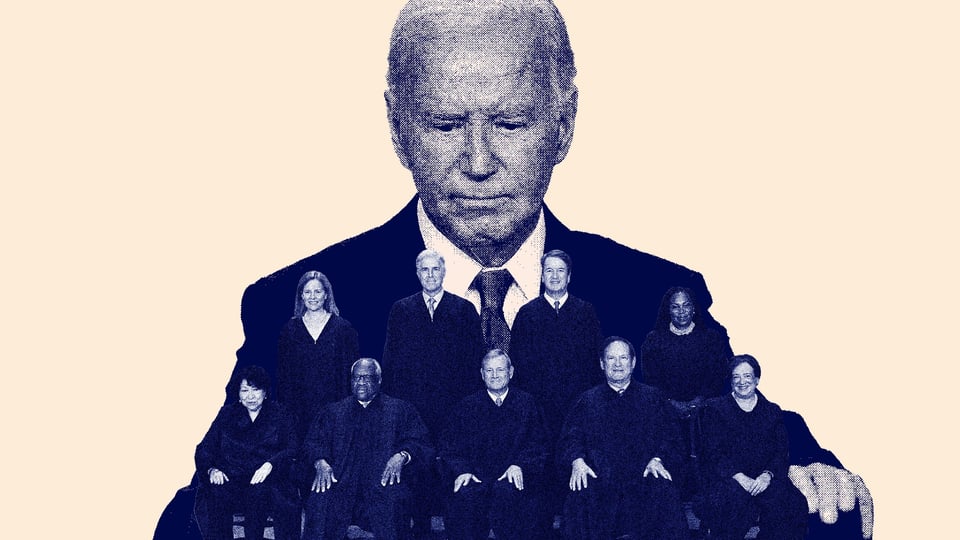
Joe Biden: My plan to reform the Supreme Court and ensure no president is above the law.
The writer is president of the United States.
We can and must prevent the abuse of presidential power and restore the public’s faith in our judicial system.
This nation was founded on a simple yet profound principle: No one is above the law. Not the president of the United States. Not a justice on the Supreme Court of the United States. No one.
But the Supreme Court’s 6-3 decision on July 1 to grant presidents broad immunity from prosecution for crimes they commit in office means there are virtually no limits on what a president can do. The only limits will be those that are self-imposed by the person occupying the Oval Office.
If a future president incites a violent mob to storm the Capitol and stop the peaceful transfer of power — like we saw on Jan. 6, 2021 — there may be no legal consequences.
And that’s only the beginning.
On top of dangerous and extreme decisions that overturn settled legal precedents — including Roe v. Wade — the court is mired in a crisis of ethics. Scandals involving several justices have caused the public to question the court’s fairness and independence, which are essential to faithfully carrying out its mission of equal justice under the law. For example, undisclosed gifts to justices from individuals with interests in cases before the court, as well as conflicts of interest connected with Jan. 6 insurrectionists, raise legitimate questions about the court’s impartiality.
I served as a U.S. senator for 36 years, including as chairman and ranking member of the Judiciary Committee. I have overseen more Supreme Court nominations as senator, vice president and president than anyone living today. I have great respect for our institutions and the separation of powers.
What is happening now is not normal, and it undermines the public’s confidence in the court’s decisions, including those impacting personal freedoms. We now stand in a breach.
That’s why — in the face of increasing threats to America’s democratic institutions — I am calling for three bold reforms to restore trust and accountability to the court and our democracy.
First, I am calling for a constitutional amendment called the No One Is Above the Law Amendment. It would make clear that there is no immunity for crimes a former president committed while in office. I share our Founders’ belief that the president’s power is limited, not absolute. We are a nation of laws — not of kings or dictators.
Second, we have had term limits for presidents for nearly 75 years. We should have the same for Supreme Court justices. The United States is the only major constitutional democracy that gives lifetime seats to its high court. Term limits would help ensure that the court’s membership changes with some regularity. That would make timing for court nominations more predictable and less arbitrary. It would reduce the chance that any single presidency radically alters the makeup of the court for generations to come. I support a system in which the president would appoint a justice every two years to spend 18 years in active service on the Supreme Court.
Third, I’m calling for a binding code of conduct for the Supreme Court. This is common sense. The court’s current voluntary ethics code is weak and self-enforced. Justices should be required to disclose gifts, refrain from public political activity and recuse themselves from cases in which they or their spouses have financial or other conflicts of interest. Every other federal judge is bound by an enforceable code of conduct, and there is no reason for the Supreme Court to be exempt.
All three of these reforms are supported by a majority of Americans — as well as conservative and liberal constitutional scholars. And I want to thank the bipartisan Presidential Commission on the Supreme Court of the United States for its insightful analysis, which informed some of these proposals.
We can and must prevent the abuse of presidential power. We can and must restore the public’s faith in the Supreme Court. We can and must strengthen the guardrails of democracy.
In America, no one is above the law. In America, the people rule.(Op-ed, The Washington Post).
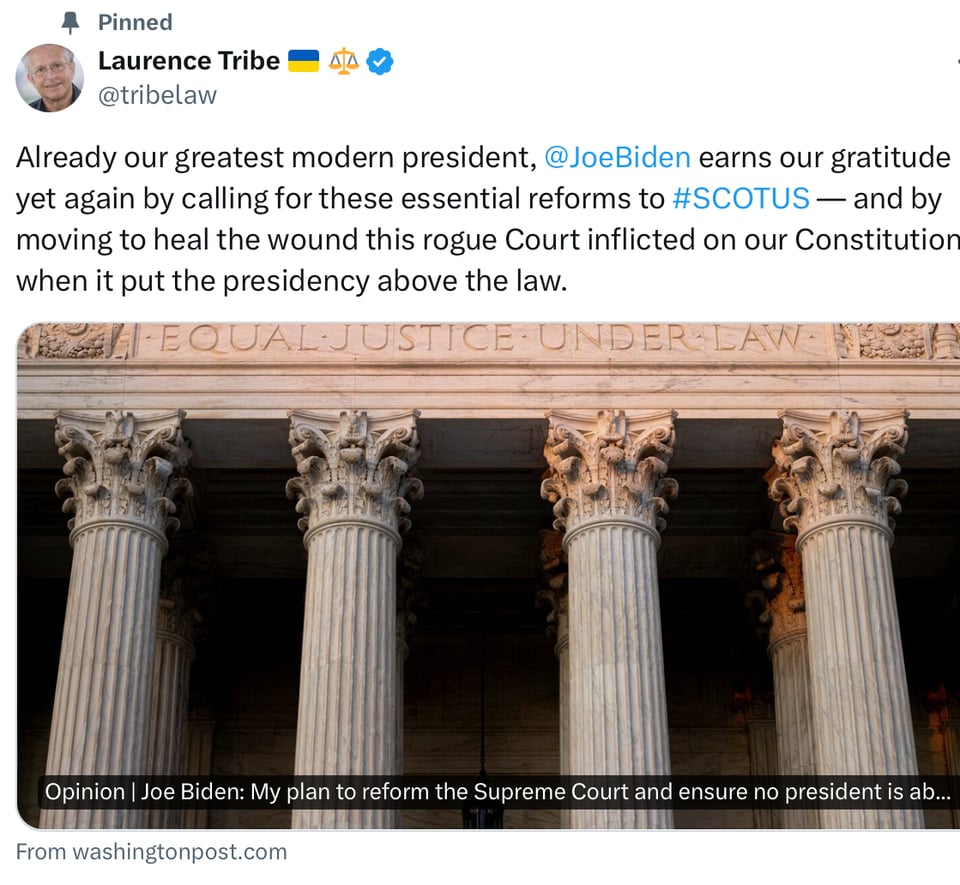
One more thing. Or two.
Kamala Harris makes clear ethics reform at the High Court is her priority too.
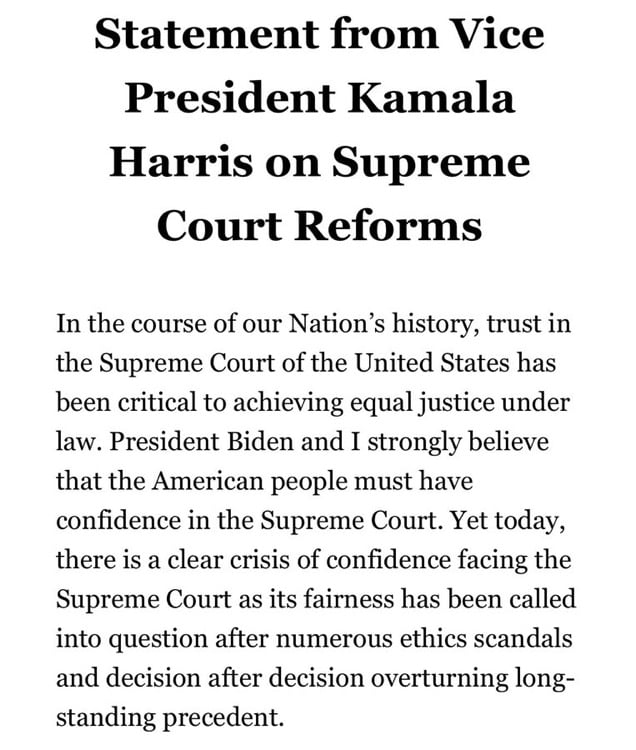
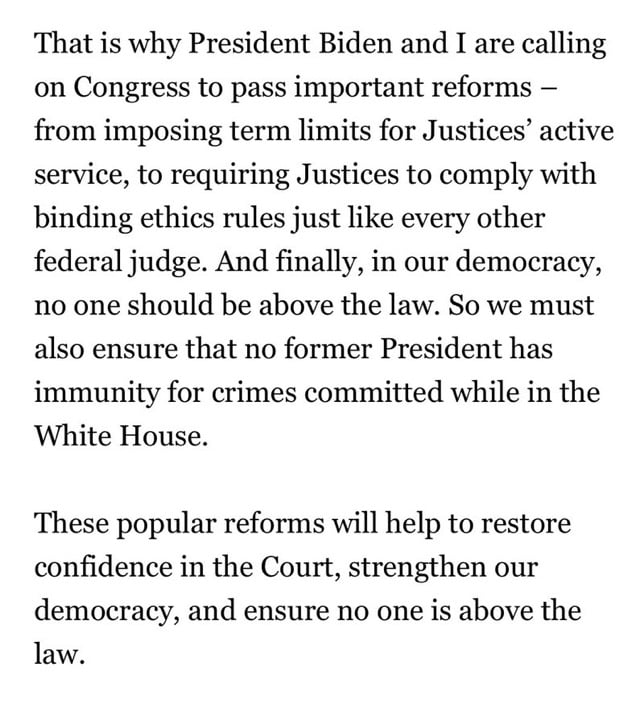
President Biden’s plan for appointment every other year utilizes Representative Ro Khanna’s plan detailed here.👇
Term Limit the Supreme Court | Congressman Ro Khanna
Establish an 18-year term limit on any Supreme Court Justices approved after the measure's passage. (Current justices would be exempt from the term limits.)
Create a regular appointment process to allow every president to nominate a new justice to the Supreme Court during each odd year, guaranteeing each president the opportunity to nominate two justices per four-year term. Permit justices who have served their 18-year terms to continue their service on lower courts.
"We can't face a national crisis every time a vacancy occurs on the Supreme Court," says Khanna. "No justice should feel the weight of an entire country on their shoulders. No president should be able to shift the ideology of our highest judicial body by mere chance. Most importantly, our country's top constitutional questions shouldn't be decided by a panel of jurists who are biding their time until a president of their choice is elected. It's time to standardize and democratize the Supreme Court."
What Khanna suggests is permissible under the Constitution.
The national nonpartisan reform group Fix the Court notes, "the Constitution does not expressly grant ‘life tenure' to Supreme Court justices. Rather, this idea has been derived from the language that judges and justices ‘shall hold their offices during good behaviour.'" Yale law professor Bruce Ackerman shares this view, arguing that the establishment of term limits is "within Congress's power to implement."
In other words, this is a reform that Congress can and should make at a point when the confirmation process has been turned into a circus warped by politics and ideological desperation.
Your Daily Reminder.
Trump is a convicted felon.
On May 30th, he was found guilty on 34 felony counts by the unanimous vote of 12 ordinary citizens.
The Convicted Felon Donald J. Trump was scheduled to be sentenced on July 11. He will now be sentenced sometime around September 18th.
Republican Mayor of 3rd Largest City in AZ Endorses Harris.
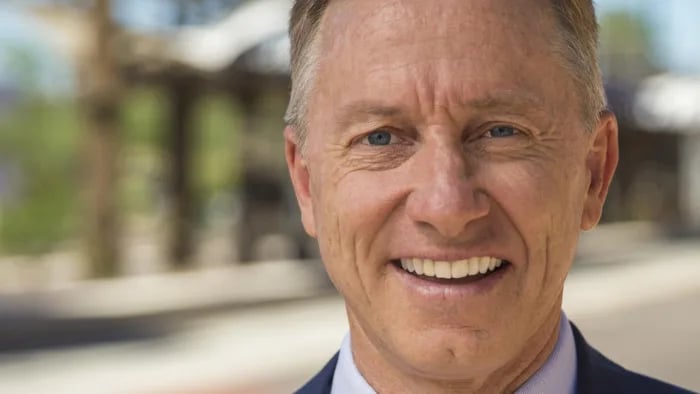
John Giles, the Republican Mayor of Mesa, Arizona, wrote an OpEd today for the Arizona Republic stating the reasons why he is endorsing Kamala Harris for President. Mesa is the 3rd largest city in Arizona, and the Arizona Republic is the largest newspaper by circulation in the crucial battleground state.
Giles listed the following reasons why he can't support Donald Trump:
- He refused to accept the outcome of the 2020 election, and continues to do so.
- He continues to trash the American legal system to delegitimize it.
- He orchestrated the "fake elector" scheme in Arizona.
- He orchestrated the sham "audit" of the election by the Arizona Senate and Cyber Ninjas.
- He blocked the bipartisan border bill negotiated in the Senate.
- He treated Infrastructure Week like a joke when cities like his badly needed it.
- He is a convicted felon and threat to the nation.
- He has threatened to abandoned NATO.
- He has eroded public confidence in our institutions.
- His advisors and associates drafted Project 2025, which is a threat to our freedoms.
- He is crude and vulgar.
Giles then listed the reasons why he isn't just anti-Trump, he is also pro-Harris:
- The Administration delivered on their promise with infrastructure funding for the Phoenix-Mesa Airport, and made technological investments in the transportation sector.
- Thousands of new jobs are being created in Arizona with the CHIPS Act.
- She has taken a strong stand against gun violence.
- She has taken a strong stand for women's rights which are under assault from MAGA Republicans.
Giles then concluded with the following:
"We can choose a future for our children and grandchildren based on decency, respect and morality — or succumb to the crudeness and vulgarity of Trump and J.D. Vance and the far-right agenda they would champion.
Arizona leaders like McCain and Sen. Mark Kelly have embodied the commitment to country over party. And it’s that same high caliber of character and leadership I see in Vice President Harris.
That’s why I’m standing with her. Kamala Harris is the competent, just and fair leader our country deserves. This year too much is at stake to vote Republican at the top of the ticket.
It will take Arizona Republicans, independents and Democrats standing together against a far-right agenda. Let us put country over party by voting to stop Trump and protect our democracy." (source. Medias Touch News).
Olympics.
Equality in Paris.

The Paris 2024 Olympics kicked off on Friday with France’s opening ceremony, Coco Gauff and LeBron James as the United States’ flag-bearers, Celine Dion’s return to performing—and a historic milestone. This year’s competition has been touted as the first “gender-equal” Games, with a 50/50 split between male and female athletes competing in Paris.
In total, 5,630 male athletes and 5,416 female athletes are set to compete over the course of the Games—just shy of 50/50. It’s a statistic of note a century after women staged their own competition after being excluded from the 1924 Olympics in Paris, 12 years after the International Olympic Committee first allowed women to compete in all sports, and a decade after the IOC set this 2024 target. Yet it’s far from the whole story.
The Olympics has called 28 out of 32 sports “fully gender-equal.” More than half of medal events are open to female athletes, with 152 women’s events, 157 men’s events, and 20 mixed-gender events. Some of these stats can be credited not to the growth of women’s sports but to the shrinking of the male field; that is the case in Olympic boxing.
“Medal count and opportunities for women’s participation are all critical factors,” says Danette Leighton, CEO of the Women’s Sports Foundation. “But we also want to look at it through a more holistic lens.”
There are other factors to keep an eye on. Men still outnumber women in coaching roles (in the 2020 Games, only 21% of U.S. head coaches were women). A gender gap still exists at the Paralympic Summer Games; 42% of athletes were women in the last Paralympic Summer Games, and the gulf widens significantly for Winter Games. And then we must consider the experience of female athletes on the ground once they make it to the Olympics. There’s been some progress on that front; Olympian Allyson Felix supported a nursery in the Paris Olympic Village, sponsored by Pampers, for athlete parents seeking childcare.
As we watch the Games unfold—and no doubt witness athletes like Simone Biles, Katie Ledecky, and many more reach new heights (Biles has already submitted a new skill for approval, which would be the sixth named after her)—we can appreciate this milestone without forgetting how much work there still is to do to support women in sports. (Emma Hinchcliffe, Broadsheet, Fortune).

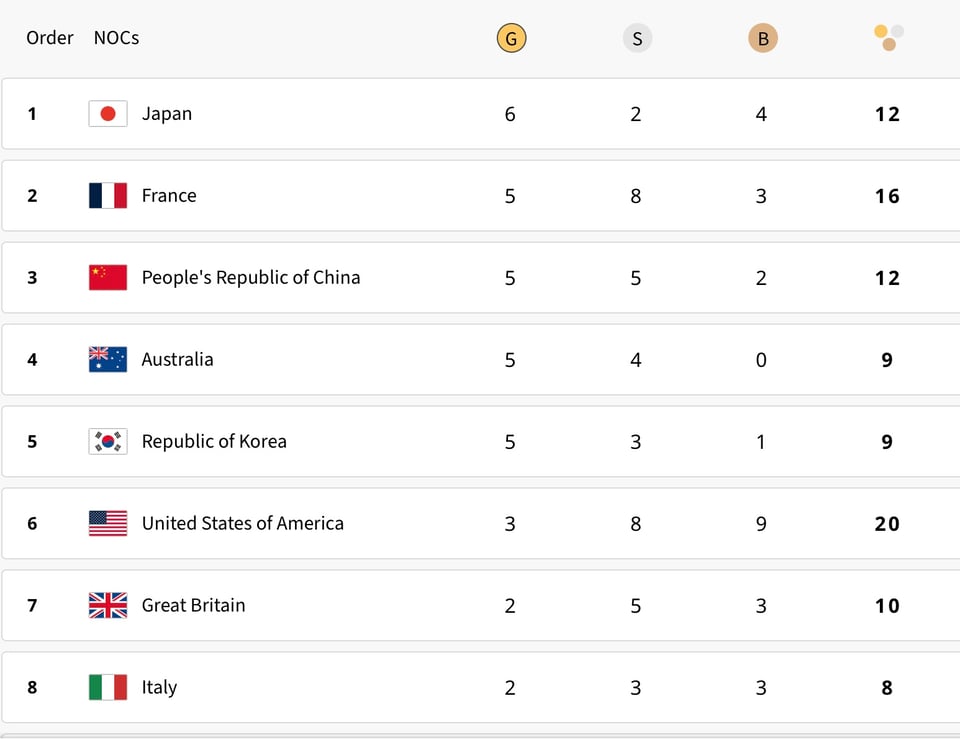
BREAKIN’ NEWS. Kamala has one fewer candidate for Vice President in a Harris Administration.
NC Gov Roy Cooper opted out of VP vetting, in part over worry about GOP Lieutenant
WASHINGTON (AP) — North Carolina Gov. Roy Cooper opted not to be a candidate in Vice President Kamala Harris’ running mate search, two people familiar with the matter said Monday, in part because of concerns that his Republican lieutenant governor would assume control when he travels out of state if he were selected.
Cooper said in a statement, “This just wasn’t the right time for North Carolina and for me to potentially be on a national ticket.” He said Harris “has an outstanding list of people from which to choose, and we’ll all work to make sure she wins.”
Under the state constitution, North Carolina Lt. Gov. Mark Robinson, who is the GOP’s nominee to replace the term-limited Cooper, becomes acting governor and can assume the Democrat’s powers when he travels out of state.
Under the state constitution, North Carolina Lt. Gov. Mark Robinson, who is the GOP’s nominee to replace the term-limited Cooper, becomes acting governor and can assume the Democrat’s powers when he travels out of state.
Cooper, according to one of the people, has expressed concern about what Robinson might do if he were to leave the state extensively for campaign travel.
Robinson is an ardent social conservative, who once called abortion “child sacrifice.” In various church pulpits, Robinson has asserted men as the rightful leaders in church and society. He once mused that leaders of the original birth control movement in the U.S. were “witches, all of ’em.” He has discussed LGBTQ people with words like “filth” and “maggots.” (Associated Press).
One more thing.
More weird Mark Robinson quotes.
“Some folks need killin’, he said.
“Whether you’re talking about Adolf Hitler, whether you’re talking about Chairman Mao, whether you’re talking about Stalin, whether you’re talking about Pol Pot, whether you’re talking about Castro in Cuba, or whether you’re talking about a dozen other despots all around the globe, it is time for us to get back and start reading some of those quotes," he said.
Despite later confessing that he and his wife had an abortion early in their relationship, Robinson said in 2021 that once a woman is pregnant, “it’s not her body anymore.”
Robinson accused former first lady Michelle Obama of secretly being a transgender woman, referring to her as "he" in a 2017 Facebook post where he called her an "anti-American, abortion and gay marriage supporting, liberal leftist elitist."
"I’ll be glad when he takes his boyfriend and leaves the White House," Robinson wrote.
Hey, help Josh Stein, Democrat for Governor in NC, win. Robinson is strange as well as extreme. Donate. Call someone in NC. Post on Social media.
— —

Will our next Vice President be Mark Kelly, Senator from AZ, or Pennsylvania Gov. Josh Shapiro,or Minnesota Governor Tim Walz?